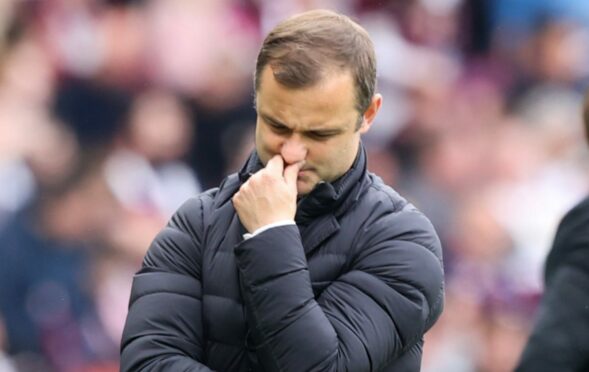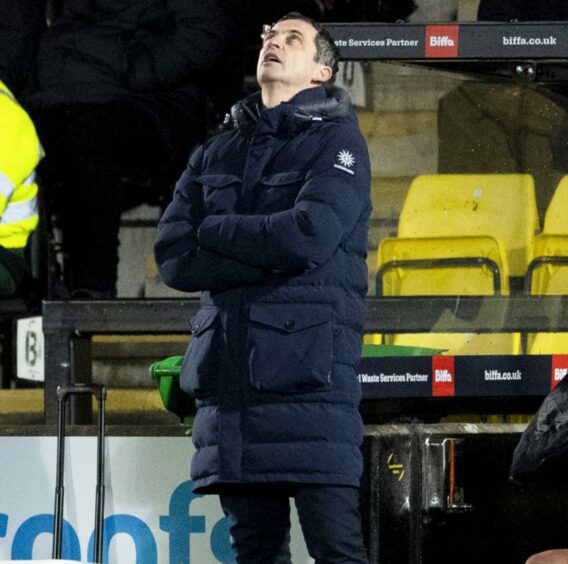
Simon Jordan recently offered football club owners his suggestion on a neat-and-tidy way to sack their managers.
“You just say: ‘I don’t know how we would cope without you – but from Monday we are going to try’.”
I don’t know if Hibernian owner, Ron Gordon, ever listens to the former backer of Crystal Palace on his TalkSport show of a morning.
But he would do well to take note, as the Leith club’s axing of Shaun Maloney was a distinctly-messy affair.
Less than 48 hours after sitting in the Hampden Park auditorium telling media of his pride in his players’ “fantastic” performance in their Scottish Cup semi-final loss to Hearts, Maloney was in the ranks of the unemployed.
There was nothing dignified about the manner of his Tuesday morning departure, either.
It apparently followed an angry exchange with chief executive, Ben Kensell, while his players were waiting to start training.
Worse, he then suffered a double slap in the face from Ron Gordon when he said his piece on a Zoom call.
His appointment was “a risk”, and the Hibs board felt forced to move Maloney on because they feared he could get them relegated.
As with the revelation from Aberdeen chief, Dave Cormack, that Stephen Glass had not been the club’s first-choice, it was an instance when letting supporters read between the lines a bit would have been a kinder option.
Given it was only a last-gasp equaliser from Motherwell at Livingston that kept Maloney and his players out of the top six, talk of going down seemed extreme.
Certainly, there is not much between the teams in the bottom six in terms of points.
And when Maloney was unceremoniously sacked, the Hibees had the best record of any of their post-season rivals.
When the former Scotland internationalist said things at the club had to be a lot different at the start of next season, it was not his own position he was thinking about.
He had, after all, only been in the post for 19 games, and had just four months with which to work with his squad.
The likes of Jordan can – and do – argue that owners are merely carrying out their duty by acting quickly when an appointment is not working out.
A tally of just six wins over the period, allied to whispers of player disquiet about the style of football they were being asked to play, support the position that it was best to cut their losses and try afresh with another boss.
Specifically, with someone more-experienced. Someone, in other words, very much like Maloney’s predecessor, Jack Ross.
The Easter Road hierarchy also sacked him – a man who had learned his trade with Alloa, St Mirren and Sunderland before moving to Easter Road – a little over a week before the club’s appearance in the League Cup Final.
That following a highly successful 2020-21 campaign, too, in which he had led Hibs to the Scottish Cup Final, and a third-place Premiership finish, their best in 16 years.
Again, the catalyst for the dismissal was a poor run of league form, in Ross’s case seven defeats in nine games.
While taking responsibility for the slump, the 45-year-old was less than pleased, later commenting that he felt the timing of his sacking was “extremely harsh”, and that he had felt he had more credit in the bank with his employers.
With the World Cup in Qatar looming, Maloney still felt compelled to leave the Belgium national team – where he was assistant to Roberto Martinez – to become a manager in his own right.
Having listened to him speak with infectious enthusiasm over a coffee a couple of years back about the joy of working with players like Kevin De Bruyne, Eden Hazard and Romelu Lukaku, it is a point worth stressing.
He was only 38 years old when Hibs appointed him. He could quite easily have stayed within the comfort zone of coaching for another few years.
The fact he instead chose to try to develop himself further, by taking a role where he was in charge, shows his ambition and strength of character.
Those qualities will be tested again as he looks to rebuild his career.
As a player with Celtic, Scotland, Aston Villa and Wigan, Maloney was bedevilled by injuries, but always kept going. Now, he can do so again.
He is young enough – and intelligent enough – to have a big future in the game, even if does turn out to be in a slightly different role.
As for Hibs, the elephant in the room for all interviews for a new manager will surely be an assurance that he’ll be given time.
Having seen two managers removed in haste by the club, candidates are entitled to seek guarantees a similar fate would not await them, should they put their heads on the block in Leith.

Enjoy the convenience of having The Sunday Post delivered as a digital ePaper straight to your smartphone, tablet or computer.
Subscribe for only £5.49 a month and enjoy all the benefits of the printed paper as a digital replica.
Subscribe